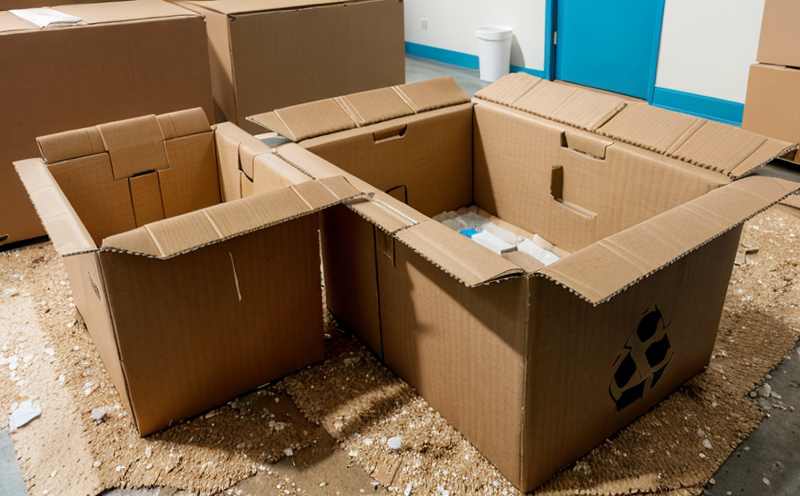ISO 2759 Burst Strength of Recycled Board
The ISO 2759 standard is a critical tool used by waste management and recycling testing laboratories to ensure the quality and reliability of recycled paper, pulp, and cardboard products. This standard specifically addresses the burst strength test for recycled board, which is essential for evaluating the mechanical properties and durability of these materials.
The burst strength test assesses how much internal pressure a sample can withstand before it bursts. In waste management and recycling testing, this information is crucial for ensuring that recycled products meet quality specifications and are suitable for use in various industrial processes. The test helps manufacturers and end-users verify the integrity of recycled materials, thereby promoting sustainability and reducing environmental impact.
The ISO 2759 burst strength test involves compressing a sample between two plates until it bursts. The force required to achieve this is measured, providing an indication of the board's resistance to internal pressure. This measurement is essential for understanding how well recycled materials can perform in real-world applications.
For accurate testing, specimens must be prepared according to specific guidelines outlined in ISO 2759. Samples are typically cut from larger sheets using a defined method to ensure consistency and repeatability. The test setup includes a burst tester that applies controlled pressure until the sample fails. This equipment is crucial for obtaining reliable results.
Understanding the burst strength of recycled board is vital in various industries, such as packaging, paper manufacturing, and recycling operations. In packaging applications, for instance, the burst strength determines how well the material can withstand internal pressures without failing during transport or storage. In paper manufacturing, it ensures that recycled fibers can be used effectively in making high-quality products. For recycling operations, this test helps optimize processes to enhance the quality of recycled materials.
The significance of ISO 2759 burst strength testing extends beyond just mechanical performance; it also plays a role in promoting sustainability and reducing waste. By ensuring that recycled board meets stringent standards, manufacturers can contribute to environmental conservation by minimizing deforestation and resource depletion. This test is a key component in the broader effort to create a circular economy where materials are reused and recycled efficiently.
In summary, ISO 2759 burst strength testing is a fundamental procedure for ensuring the quality and reliability of recycled board. It provides valuable insights into the mechanical properties of these materials, which are essential for various industries. By adhering to this standard, laboratories can contribute significantly to sustainable practices in waste management and recycling.
Why It Matters
The burst strength test is critical for ensuring that recycled board meets the necessary quality standards required by industries such as packaging, paper manufacturing, and recycling. This test helps manufacturers and end-users verify the integrity of recycled materials, thereby promoting sustainability and reducing environmental impact.
- Ensures compliance with international standards (ISO 2759).
- Guarantees the mechanical properties required for various applications.
- Promotes sustainable practices by optimizing recycling processes.
The results of this test are particularly important in packaging industries, where recycled board must withstand internal pressures during transport and storage. In paper manufacturing, it ensures that recycled fibers can be used effectively to make high-quality products. For recycling operations, the test helps optimize processes to enhance the quality of recycled materials.
By adhering to ISO 2759 standards, laboratories contribute significantly to environmental conservation by minimizing deforestation and resource depletion. This test is a key component in creating a circular economy where materials are reused and recycled efficiently.
Why Choose This Test
Selecting the ISO 2759 burst strength test for your waste management and recycling projects offers numerous advantages. This test ensures that you have reliable, high-quality recycled board products that meet stringent international standards.
- Reliable Data: The test provides consistent and repeatable results, ensuring accurate assessments of mechanical properties.
- Compliance: It ensures compliance with ISO 2759, a widely recognized standard in the industry.
- Sustainability: By using recycled materials that meet these standards, you contribute to environmental conservation and resource efficiency.
- Quality Assurance: The test helps maintain consistent quality across all batches of recycled board.
The burst strength test is essential for various industries, including packaging, paper manufacturing, and recycling operations. In packaging applications, it ensures that the materials can withstand internal pressures without failing during transport or storage. In paper manufacturing, it guarantees that recycled fibers are used effectively in making high-quality products. For recycling operations, this test optimizes processes to enhance the quality of recycled materials.
By investing in ISO 2759 burst strength testing, you can ensure that your recycled board meets the highest quality standards, thereby promoting sustainability and reducing environmental impact.
Quality and Reliability Assurance
- Consistent Results: The test provides reliable and repeatable results, ensuring accurate assessments of mechanical properties.
- Compliance Verification: Ensures that the recycled board meets international standards like ISO 2759.
- Sustainability Promotion: By adhering to these standards, you contribute to environmental conservation and resource efficiency.
- Quality Control: The test helps maintain consistent quality across all batches of recycled board.
The ISO 2759 burst strength test is crucial for maintaining high-quality recycled board products. It ensures that these materials meet the necessary mechanical property requirements, which are essential for various industries.
In packaging applications, this test guarantees that recycled board can withstand internal pressures during transport and storage without failing. In paper manufacturing, it ensures that recycled fibers can be used effectively to make high-quality products. For recycling operations, this test optimizes processes to enhance the quality of recycled materials. By adhering to these standards, you contribute significantly to environmental conservation and resource efficiency.





